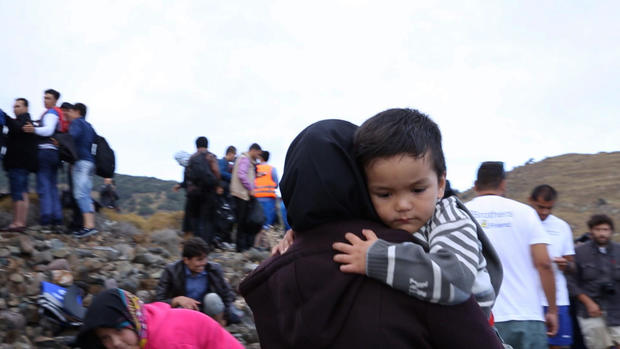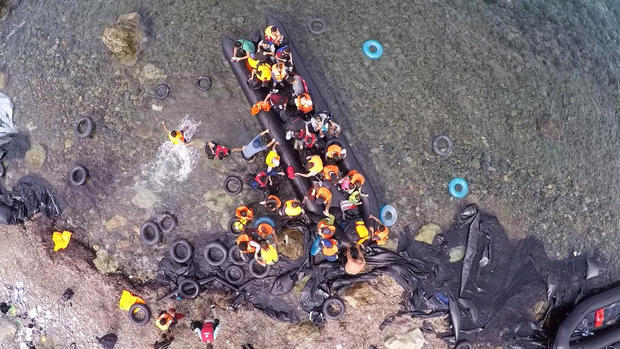Seeking Asylum
The following is a script from "Seeking Asylum" which aired on October 18, 2015. Anderson Cooper is the correspondent. Patricia Shevlin and Miles Doran, producer.
Hundreds of thousands of people fleeing war or poverty in the Mideast have been risking their lives to seek asylum in Europe. Most come from Syria and hope to make it to Germany with its booming economy and promise of jobs.
Last month, German Chancellor Angela Merkel surprised the world announcing her country would not stop anyone from seeking asylum. After that, the number of asylum seekers doubled, then tripled. How is Europe dealing with this wave of desperate people? To find out we started where most of the new arrivals first set foot in Europe: the small Greek island of Lesbos.
They begin to arrive in the delicate light of dawn. War-weary and desperate packed into rubber boats never meant to cross such a sea. The boats are supposed to hold 12, but 40 to 50 men, women and children are squeezed on board. Most have traveled for days or weeks from Syria, Iraq or Afghanistan, just to reach the Turkish coast. Then, for the six-mile journey across the Aegean Sea, they've paid Turkish smugglers a small fortune -- as much as $1,500 a piece -- half-price for kids.
When they finally land on Lesbos...scared, exhausted, many have no idea where they are. We noticed one of the first things they do is unwrap cellphones protected in plastic. They want to call their relatives to let them know they didn't drown.
Ahmed Dosum and his wife and son left Syria just six days ago.
Anderson Cooper: Where are you hoping to go?
Ahmed Dosum (translator): Germany.
Anderson Cooper: Why Germany?
Translator: His nephew is there.
Anderson Cooper: Is this your son? You hope he gets a new life in Germany?
Translator: We hope a better life for him, and to never suffer like his father....from the bomb.
Anderson Cooper: Barrel bomb. So you feel safe now?
Translator: Thanks to God. He just kissed the ground.
In the hour-and-a-half we were on this stony stretch of beach, 15 dinghies arrived. And elsewhere on the island there were plenty more. Some 4,000 people land here each day. Nearly three-quarters are Syrian, and they don't stay on the beach very long.
Kirk Day: They have an internal clock. And they are desperate to get to Europe as quickly as possible.
Kirk Day is the emergency field director for the International Rescue Committee on Lesbos.
Kirk Day: What they leave behind first and foremost is the lifejackets.
Anderson Cooper: I mean, this is the kind of thing a child is p-- you know, wears in a swimming pool. It's not what you wear crossing an ocean.
Kirk Day: No, and it says right here, "Not for use in boating." Our main concern is that you're going to continue to have high numbers of refugees coming. And I think unfortunately what we're going to have is more capsized boats and more drownings.
While we were on Lesbos, four people who drowned and washed ashore were buried. No one knew their names. More than 3,000 people have drowned trying to reach Europe so far this year. Engines often fail and overcrowded boats capsize. That's how this 3-year-old Syrian boy, Aylan Kurdi, drowned in September. After these photographs of his body on a Turkish beach were seen around the world, volunteers started showing up on Lesbos to help new arrivals make it onshore. But for months, it's been private aid groups like the International Rescue Committee, doing what the Greek government, hobbled by its own economic crisis, was not able to do.
Anderson Cooper: Governments aren't giving you any help?
Kirk Day: No. It's as if there's been an attrition strategy put in place. Make it as difficult for people to come. Make them risk their lives. Make them live in unsanitary conditions and fewer and fewer people will come. And nothing could be farther from the truth.
Anderson Cooper: Who are the people who are coming?
Kirk Day: In the beginning it was mostly Syrians. And mostly they were men and everybody was saying, "They're all young men, they're all young men. Where's the families?" Over the course of the past three months, you've had a higher percentage of women and children come. Male members of families went first to see that it was safe and to get settled into Europe and then are calling for their families to come.
Syrians and others have to get fingerprinted and registered before they can leave Lesbos. The process used to take up to a week. Now, it's so fast that when we went to the port where a ferry departs daily for Athens, we were surprised to see Ahmed Dosum and his little boy. Just 10 hours after arriving on the island, they had their ferry tickets and were ready to leave.
Anderson Cooper: So you got registered? Oh, you got the ticket.
They're journey won't be easy. The route to Germany keeps changing as borders open and close along the way and greater controls are put in place. From Greece, most now travel through Macedonia then Serbia, Croatia, Slovenia, then on through Austria.
At Austria's border with Germany, we found hundreds sleeping in tents waiting to be allowed to cross. German authorities had just slowed down the entrance process. Only a handful at a time were being allowed in.
Not far away, at Salzburg's central train station, hundreds more were waiting in an underground garage.
Heinz Schaden: The maximum capacity here in this shelter is 800 but we've had nights where we've had 1,300 here.
Heinz Schaden is mayor of Salzburg. He has no idea each day how many people he will have to find shelter for.
Anderson Cooper: Do you get advanced notice when Germany decides to slow the number of people coming through?
Heinz Schaden: I don't get advanced notice but I notice right away.
Anderson Cooper: Can you even imagine what would happen if Germany closed its borders?
Heinz Schaden: I don't want to imagine that, because then we have a situation which will be a humanitarian catastrophe.
Anderson Cooper: Do you worry about security? Do you really know who a lot of these people are, where they're really from?
Heinz Schaden: I'm not worried about security. If a terrorist really wants to come to our country or to Germany or anywhere in Europe - they find their ways. And they certainly do not march along with the refugees all the way from Turkey.
When a train for Germany is expected many who've waited for days, rush to line up, hoping their chance has finally come. But while we were there just one train left Salzburg for Germany. On board we found Mohammad Pathlavay and his mother. They left Baghdad two weeks ago.
Anderson Cooper: Do you know much about Germany?
Mohammad Pathlavay: Germany? Not that much, no.
Anderson Cooper: What do you think it's going to be like?
Mohammad Pathlavay: I think better than anything.
Anderson Cooper: Better than anything. What are you most looking forward to?
Mohammad Pathlavay: I just want to have a good life, like, with my mother in peace.
It was Oktoberfest when we got to Germany. There was music and bratwurst and plenty of beer. A culture shock for anyone, but for Muslims from a warzone it must seem especially strange.
Anderson Cooper: Do they have a real sense of what life in Germany is going to be like?
Katharina El Masri: I often hear Germany is a jannah. And a jannah is an Arabic word for paradise. And, obviously, that is not the case, you know--
Anderson Cooper: The streets are paved with gold.
Katharina El Masri: Yeah.
Katharina El Masri runs Save Me Munich which helps new arrivals learn to adjust to life in Germany.
Anderson Cooper: They think it'll be easy to find a job, find housing, get--
Katharina El Masri; Sure, sure. But the relatives who are already in Germany, you know, they would call home and tell them, "Oh, it is amazing here. You know, I'm having a good life, I'm very successful." Obviously, in most cases, that is not true.
More than 500,000 new arrivals have already crossed into Germany in the last nine months. The German government expects half a million more by the end of the year. They're placed in shelters throughout the country where they have to wait for months to be granted asylum. If they are, they get free language classes, full government benefits and can start looking for a job
Anderson Cooper: What are the biggest challenges?
Katharina El Masri: The biggest challenge is the find housing.
Anderson Cooper: To find affordable housing.
Katharina El Masri: At the moment we're having such a huge influx that the community shelters are completely overcrowded, you know? People are sharing rooms with five, six, seven other men, you know? There is no space for privacy.
In Berlin, fights have erupted as frustrated asylum seekers wait days in lines in order to register. And smaller cities are struggling to find shelter for so many people. Wolfgang Panzer, the mayor of Unterhaching, a town of 24,000, has been told to expect at least 1,000 new arrivals. He says he welcomes them but for now can only put them in temporary shelters like this.
Anderson Cooper: Do you have other spaces, if more people come?
Wolfgang Panzer: No, that's our problem, we have no spaces.
Anderson Cooper: Is Germany being asked to do too much compared to the rest of Europe?
Wolfgang Panzer (translator): From my point of view yes, especially when it comes to the amount of people. What our government did is what led to all these masses coming to us.
Many Germans now agree. Chancellor Angela Merkel's approval rating has dropped, and while Germany, with its aging population, needs new workers...absorbing so many so fast is a $6 billion burden with no end in sight.
Anderson Cooper: A lot of people don't want them here.
Katharina El Masri: They would say, "We have take them in, we have to integrate them. But please not in my neighborhood, you know?" And that is not because these people are racists. This is often that idea stems from the fear of the unknown, you know?.
One of the Syrians Katharina El Masri is trying to help is Bassam al-Tarifi, a doctor who has been in a shelter in Munich since August. He gets about $160 a month from the German government. It will take him months to get asylum. And it could take him more than a year to be allowed to bring his wife and five daughters from Turkey.
Anderson Cooper: It is much harder than you had realized.
Dr. Bassam al-Tarifi (translator): When it becomes a year, year-and-a-half, that was something I did not expect at all.
He is desperately lonely, but won't allow his family to take the dangerous journey by boat as he did.
Bassam al-Tarifi: I might risk my life for my kids, but there is no way I could risk any of their lives.
The number of new arrivals may drop in the next few months because crossing by sea in winter is especially dangerous. But come spring, a new wave of asylum seekers is once again expected to wash up on Lesbos' shores.


